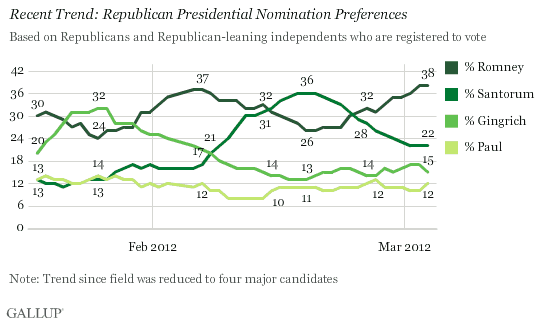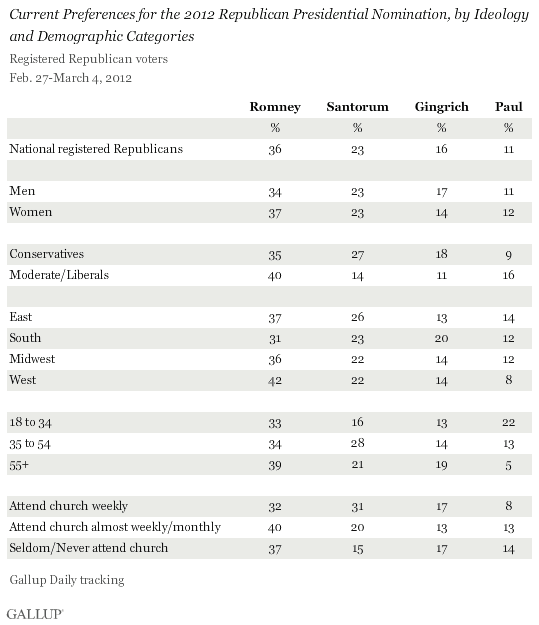PRINCETON, NJ -- Mitt Romney leads Rick Santorum by 16 percentage points in Feb. 29-March 4 Gallup Daily tracking of national Republican registered voters' preferences for their party's nomination. Romney is at 38%, Santorum 22%, Newt Gingrich 15%, and Ron Paul 12%. Santorum led Romney by 10 points as recently as Feb. 20.

Romney's current 38% of the vote is the highest percentage any candidate has obtained since Gallup Daily tracking of the race began on Dec. 1, and comes in the wake of Romney's wins in the Feb. 28 Michigan and Arizona primaries. Romney won the Washington state GOP nonbinding caucuses on Saturday, but that victory would have had only a limited impact on the latest five-day rolling national average, which extends back through last Wednesday.
The March 6 slate of 10 primaries and caucuses in the so-called Super Tuesday states has the potential to once more alter the national standings of the candidates. Romney is widely expected to lose in Gingrich's home state of Georgia, and faces a tough challenge in Tennessee and Oklahoma. Romney is likely to win in his home state of Massachusetts and the contiguous state of Vermont. The critical state will be Ohio, partly because pre-election polling shows the race there to be very close and partly because it is considered to be a bellwether state that will be important in this fall's election.
Romney's strong momentum nationally in recent days suggests that he may do better than expected in the 10 Super Tuesday states.
Romney led Gingrich by as much as 24 points in early to mid-January after winning the New Hampshire primary, but then lost his lead to Gingrich, who went on to win in South Carolina. Romney regained a solid lead by early February after winning the Florida primary, but then lost that lead after Santorum won contests in three states in early February. Now, for the third time since Dec. 1, Romney is solidly back in the lead position after his Arizona and Michigan primary victories last Tuesday.
Romney Leads or Ties Santorum Across All Groups
At this point, Romney leads or ties Santorum (and the other two candidates) across every major ideological and demographic category, based on analysis of weekly data from Feb. 27-March 4.
Romney leads Santorum by 35% to 27% among conservatives, and is ahead of Santorum by 32% to 31% among weekly churchgoing Republicans. Romney was losing to Santorum by seven-point margins among each of these groups a week ago.

Women's issues have come to the forefront in recent weeks, bringing with them a focus on Santorum's positions on issues such as abortion, contraception, and the family. At this point, however, Republican men's and women's preferences differ little. For the week of Feb. 27-March 4, Romney led Santorum by 14 points among women and by 11 points among men.
Implications
The battle for the GOP presidential nomination so far this year has been characterized by frequent shifts in Republicans' preferences, mostly as the result of debates and real-world voting behavior in state primaries and caucuses. Current front-runner Romney's support has either surged or fallen back after almost every major primary or caucus vote.
Thus, the outcome of Super Tuesday's voting, particularly in Ohio, has the potential to once again affect the candidates' standing among Republicans nationwide. If Romney wins in Ohio and does well in other states in addition to Massachusetts and Vermont, he almost certainly will maintain or expand his lead among Republicans nationally, and may be more firmly on the road to the nomination. If Romney loses in Ohio or does relatively poorly in other states, his support could once again begin to sag, signifying the continuation of the roller-coaster race that has typified the contest for the GOP nomination so far this election cycle.
Survey Methods
Results are based on telephone interviews conducted as part of Gallup Daily tracking Feb. 29- March 4, 2012, with a random sample of 1,211 Republicans and Republican-leaning independents, aged 18 and older, living in all 50 U.S. states and the District of Columbia, who are registered to vote.
For results based on the total sample of Republican registered voters, one can say with 95% confidence that the maximum margin of sampling error is ±4 percentage points.
Interviews are conducted with respondents on landline telephones and cellular phones, with interviews conducted in Spanish for respondents who are primarily Spanish-speaking. Each sample includes a minimum quota of 400 cell phone respondents and 600 landline respondents per 1,000 national adults, with additional minimum quotas among landline respondents by region. Landline telephone numbers are chosen at random among listed telephone numbers. Cell phone numbers are selected using random-digit-dial methods. Landline respondents are chosen at random within each household on the basis of which member had the most recent birthday.
Samples are weighted by gender, age, race, Hispanic ethnicity, education, region, adults in the household, and phone status (cell phone only/landline only/both, cell phone mostly, and having an unlisted landline number). Demographic weighting targets are based on the March 2011 Current Population Survey figures for the aged 18 and older non-institutionalized population living in U.S. telephone households. All reported margins of sampling error include the computed design effects for weighting and sample design.
In addition to sampling error, question wording and practical difficulties in conducting surveys can introduce error or bias into the findings of public opinion polls.
For more details on Gallup's polling methodology, visit www.gallup.com.
